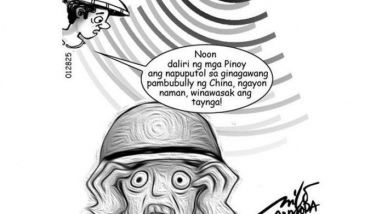Limits to science?
Perhaps to put it more completely, we can ask: Are there limits to our capacity to know, understand, invent, reason out? Are there limits to our sciences?
I am inclined to say, no. And the reason is simply because this capacity of ours is a spiritual capacity, not material, and as such, it is oriented toward infinity. We can always know more and more, unless we get tired and say enough. But in theory, our capacity to know, reason, and go deeper into our sciences is endless.
But I must also say that there are limits. Aside from our limited physical capacity that will always condition our power to know, the pursuit for knowledge has to contend also with the limited object to which it is aimed at.
Thus, our natural and physical sciences are limited precisely by the natural and physical limitations of their particular object, be it in physics, chemistry, biology or astronomy. They limit themselves to what is empirical, observable, measurable in a tangible way. They don't go into the ethical and moral aspects.
Even in these sciences where the objects can be observed and measured physically, many things can still be missed out because of either the minuteness or the immensity of their dimensions. They may exceed the normal range of our capacity to observe and measure.
The limitations can even be more pronounced when we start dealing with the social sciences like economics, history, political science, etc., since a lot of intangibles are involved.
How does one completely measure people's preferences, biases or the inner workings of their mind and heart, for example? Surveys, even the fairest of them, can only do so much.
Even our philosophies and theologies, including those that are considered correct and safe, can only do so much, even if they can cover quite a bit. That's simply because they have to contend with the mysteries of the spiritual supernatural world.
Mysteries are mysteries. They surpass our capacity to know and understand, but they are true, not false, not make-believe or myths and legends. One might ask: And how would we get to know about these mysteries if they precisely surpass our capacity to know?
The answer is simple. They have been revealed historically by someone whom we can trust because he died and rose from the dead, which is also a fact, not a myth. In the end, our capacity to know and understand depends more on our trust, on our faith in someone whom we can trust completely, rather than on what our senses can perceive and our intelligence can discover and understand.
This has always been the case even in our daily ordinary life. We have to trust someone so we can move on with life and hopefully get to understand things better as we go along. The child trusts his parents so he can do the things he ought to do. The student has to trust his teacher, so he can learn and get into the position to learn more things on his own, etc.
Thus, there is that dictum: believe first so you may understand, though after understanding something, one has to make that understanding a fuel to strengthen his belief, that in turn should deepen his knowledge, in a virtuous cycle that would bring one to the ultimate dimensions of the spiritual and supernatural world.
It is this belief that can drive us to know more and to transcend the limits of our human capacity to know and understand. It is belief that generates love that in turn perfects knowledge, in accordance to St. Paul's words:
"Knowledge puffs up, but love builds up. If any one imagines that he knows something, he does not yet know as he ought to know. But if one loves God, one is known by him." (1 Cor 8,1-3)
In other words, it is faith and love that can give the knowledge that we ought to have, a knowledge freed from negative and harmful effects, like sarcasm, anger, malice, slander, manipulation, deception, pride, conceit, arrogance, etc.
At the moment, we have many brilliant people who appear to be knowledgeable because they have a heavy load of info, but who lack faith and charity. They are just guided by purely human standards: temperament, social consensus, ideologies, etc. As a result, they create more conflict and division in society, more injustice and so on.
Without devaluing the objective role of our human capacity to know and the body of knowledge that results from it, we should also acknowledge their limits and have recourse to faith, hope and charity that would give us the full picture of things.
- Latest























